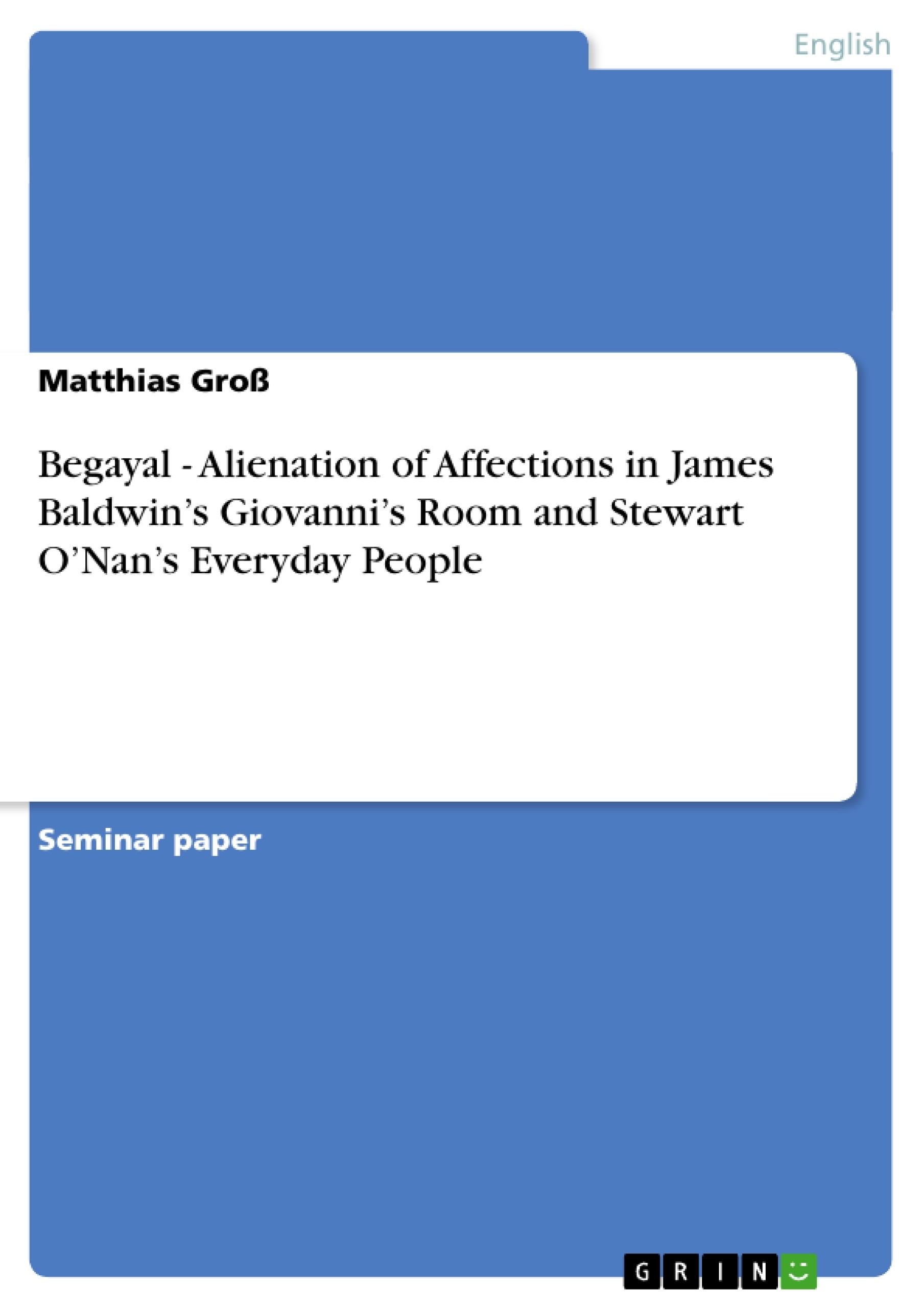This paper on adultery in James Baldwin’s Giovanni’s Room and Stewart O’Nan’s Everyday People and their adulterous characters David and Harold was commenced by a seminar on the representation of adultery in the novel. Even though the discussions in class touched upon various aspects of the crime of infidelity, such as different historical and literary periods or cultural aspects and developments, however, to my understanding it lacked an important facet. Out of convention, probably, adultery was only discussed in the constellation of heterosexual extramarital affairs, that is, either a husband was unfaithful to his wife with another woman, or a wife with another man. Apparently, the awareness of the two novels that I will discuss in this paper and their specific rendering of the issue of adultery contributed to or even nourished my feelings of missing the essential aspect of same-sex adultery. In my research for this paper I realized that my opinion was justified, for homosexual affairs outside of heterosexual marriages have also concerned jurisdiction, legislation, and public opinion on a larger scale and still do. In this paper, however, I will only discuss these aspects marginally, for the focus lies upon the examination of adultery in literature.
Inhaltsverzeichnis (Table of Contents)
- About this Paper
- Adultery as an Entrenched Crime - Introductory Remarks
- Scarlet Letters
- Adultery in the Novel
- Same-Sex Adultery
- Reasons for Same-Sex Adultery
- Breaks of Identities
- The Significance of Places and Settings
- Conclusion
- Bibliography
Zielsetzung und Themenschwerpunkte (Objectives and Key Themes)
This paper explores the theme of adultery in James Baldwin's Giovanni's Room and Stewart O'Nan's Everyday People, focusing on the portrayal of same-sex adulterous relationships. The paper aims to analyze how these relationships are depicted within the context of societal norms and conventions surrounding adultery, particularly those related to gender roles and expectations.
- Same-sex adultery as a theme in literature
- Societal perceptions and legal implications of adultery
- Gender roles and expectations in relation to adultery
- The portrayal of adulterous relationships in Giovanni's Room and Everyday People
- The significance of places and settings in relation to adultery
Zusammenfassung der Kapitel (Chapter Summaries)
- About this Paper: This section outlines the author's motivation for exploring same-sex adultery in literature, highlighting the lack of focus on this aspect in previous discussions on adultery.
- Adultery as an Entrenched Crime - Introductory Remarks: This section explores the historical and cultural contexts of adultery as a crime, examining legal punishments and societal attitudes throughout different periods and cultures. It addresses the binary opposition between marriage and adultery, emphasizing the dependency of adultery upon marriage.
- Scarlet Letters - Adultery in the Novel: This section delves into the representation of adultery in the novels Giovanni's Room and Everyday People, setting the stage for the analysis of same-sex adulterous relationships.
- Scarlet Letters - Same-Sex Adultery: This section focuses on the portrayal of same-sex adultery in the novels, examining the characters' experiences and motivations.
- Scarlet Letters - Reasons for Same-Sex Adultery: This section investigates the reasons behind the same-sex adulterous relationships depicted in the novels, analyzing the social, cultural, and personal factors that contribute to these choices.
- Scarlet Letters - Breaks of Identities: This section analyzes how the adulterous relationships in the novels contribute to or disrupt the characters' identities, exploring the themes of alienation and self-discovery.
- Scarlet Letters - The Significance of Places and Settings: This section examines how the chosen settings and places in the novels influence the portrayal of adultery, highlighting the relationship between environment and character behavior.
Schlüsselwörter (Keywords)
The key themes and concepts explored in this paper include same-sex adultery, societal norms and conventions, gender roles and expectations, Giovanni's Room, Everyday People, James Baldwin, Stewart O'Nan, alienation, identity, and the significance of places and settings.
Frequently Asked Questions
What is the central theme of this paper?
The paper examines same-sex adultery in James Baldwin’s "Giovanni’s Room" and Stewart O’Nan’s "Everyday People."
How is adultery traditionally discussed in literature?
Traditionally, adultery is viewed through a heterosexual lens. This paper argues that same-sex infidelity is a crucial but often overlooked facet of the literary theme.
What are the consequences for the characters David and Harold?
Both characters experience a break in their identities and deep alienation as they navigate their desires against societal norms.
What is the significance of the settings in these novels?
Places like the "room" in Baldwin’s novel act as confined spaces where private desires clash with public expectations and social shame.
How does jurisdiction relate to the theme of adultery?
Historically, adultery was a punishable crime. The paper briefly touches on how legal and social punishments shaped the experience of unfaithful partners.
- Citation du texte
- Matthias Groß (Auteur), 2006, Begayal - Alienation of Affections in James Baldwin’s Giovanni’s Room and Stewart O’Nan’s Everyday People , Munich, GRIN Verlag, https://www.grin.com/document/75363



